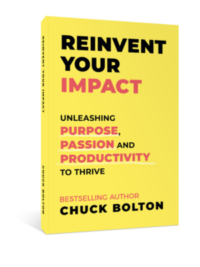Encouraging Purpose in Your Children
 Eighteen months into the pandemic, it may be more important than ever to encourage purpose in our children.
Eighteen months into the pandemic, it may be more important than ever to encourage purpose in our children.
Forty years ago, after graduating high school, you either went to work at the factory, joined the military, enrolled in vocational school to learn a trade, or entered college. The options were pretty straightforward and there was an implicit “deal” of what you could expect from each choice. Graduates made their decision and could more or less follow their paths to a middle-class life.
Today, young people have limitless options. That is both exciting and terrifying. What’s missing is they’ve got no clear answers. As young people think a lot about their futures, this lack of clarity too often creates anxiety and depression. They see a volatile and uncertain world that feels scary and threatening.
For far too many youngsters, the stress is too much to handle. The National Institutes of Health reports one in three of all adolescents ages 13 to 18 will experience an anxiety disorder. Other studies show a sharp rise in depression among teens and young adults over the last decade.[i]
While there are a number of reasons that drive the increase in anxiety and depression of young people, worry about the future contributes to their decline in mental well-being.
If ever there was a time for parents to get connected with their kids and help them, it’s now. This is where parents need to step in. An excellent source for parents and caring adults is William Damon’s book, The Path to Purpose: How Young People Find Their Calling in Life. Damon is a Stanford University professor on adolescence.[ii]
Damon writes, “In our interviews and surveys, only about one in five young people in the 12-26-year age range express a clear vision of where they want to go, what they want to accomplish in life, and why. The largest portion of those we interviewed – almost 60% – may have engaged in some potentially purposeful activities, or they may have developed some vague aspirations; but they do not have any real commitment to such activities or any realistic plans for pursuing their aspirations. The remaining portion of today’s youth population – almost a quarter of those we interviewed – express no aspirations at all. In some cases, they claim that they see no point in acquiring any.”
He describes four groups of young people.
The Disengaged express no interest in purpose, and they made up 20% of the sample of twelve hundred young people between 12 and 26.
The Dreamers consisted of 25% of the sample. Dreamers had ideas about purposes but had done little or nothing to actively try out their ideas.
The Dabblers were those who had engaged in some activities that were potentially purposeful but showed few signs of committing themselves to these pursuits over time. Dabblers represented 31% of the sample.
Finally, those who found something meaningful to dedicate themselves to, sustained this interest over a period of time, and expressed a clear sense of what they were trying to accomplish and why, made up 20% of the group. He described this group as the Purposeful.
If you have young people in the world you care about, which group do you believe they fall into today?
As a parent or caring adult, there is an opportunity you have to assist your children discover their purpose.
The hectic lifestyles of many parents spill into the lives of children. With everyone on the go, family interactions fray and face-to-face connections decrease. When parents do try to help their kids, their suggestions are usually tactical in nature, offering no strategy. Statements like, “Get good grades,” don’t provide useful direction or clarity to the “Why?” and “What kind of work will I do when I get older?”
Damon believes that if young people had a goal in mind and then went to college or other post-high school training with that purpose in mind, taking classes to prepare themselves for achieving it, saying, “Here’s what I need to do in order to fulfill my dream,” that would be a much superior approach than simply saying, “Get the degree and figure out why later.”
When young people have a destination, the right decisions along their journey become clearer. Without purpose, being a good kid can feel like an arbitrary list of things to do and not do. With purpose, doing the right thing is clear because it’s in service of a greater goal.
Damon writes, ““Once a young person has taken on a purposeful quest, his or her personality begins to be transformed by the activities and events of the quest. Out of necessity, the youngster acquires such capacities as resourcefulness, persistence, know-how, and a tolerance of risk and temporary setback. Character virtues such as diligence, responsibility, confidence, and humility get a boost from the experience of making a commitment to a challenging purpose and seeing it through. What’s more, literacies of all kinds (verbal, mathematical, cultural) develop in ways that extend well beyond anything previously learned in the youngster’s home or classroom.”
What can you do to help young people discover their purpose?
Start by being a good role model. When you convey your individual purpose and your values, and how you chose those, that’s a great start. Share the meaning you get from your work. Your job does more than pay the bills. What is it that you do that makes the world a better place, contributes to the common good, or makes someone happy?
For instance, how did you know you wanted to raise a family? At what point did you know you wanted to be a marketing manager, a police officer, a principal, a __________? Share the meaningful experiences from your life and your setbacks that helped you gain this insight. Whatever your purpose is, discuss how you knew it was your calling and how it contributes to your everyday life satisfaction. When your children see you living a life of purpose, impact, and joy, they’ll be encouraged to do the same. Tell them your purpose story.
If you regret not following your dreams, don’t shy away from relaying those lessons learned to your children. This may help them gain knowledge from your experience.
Share with your children that what they do matters. While they get told what to do a lot at school and home, this will change over time. They have the personal power to make decisions and take actions. They will be able to make decisions and will be called on to make a difference. They can make the world a better place. If they don’t make a difference somewhere to someone, life isn’t going to feel very meaningful. The choices they make and the actions they take matter. People cannot have a sense of purpose until they know how much they matter. When young people have the confidence to know they matter, they can begin to imagine their purpose in life.
Realize you aren’t the creator of your child’s purpose. You don’t create purpose and passion for your kids any more than you can create their personality. What you can do is to gently ask questions about their opinions and interests. You can expose them to new things and see how they respond. You can introduce options. You can encourage them to go deeper to experience and learn more about topics that resonate. Pay attention to what drives them to keep learning. If a teen loves writing stories, and is challenged to write more to improve, encourage that passion. Their talent and interest could help them find a life of purpose that is right for them.
Create a safe environment for dialogue. Dinners, watching the news together, and trips in the car each offer organic situations that lend themselves to discussing topics that are important to your youngster. You can ask them why their topics of interest fascinate them. It’s better to have small, frequent conversations, too. This is a process, not a one and done discussion.
Avoid questions like “What do you want to do with your life?” Instead, ask non-intimidating questions such as, “When was a time you helped someone?” or “What do you think your best qualities are?” “What kinds of things do you really care about and why?” “What does it mean to have a good life?” “What does it mean to be a good person?”
Let your kids know they have unique gifts. Describe the gifts you see them possessing and have a dialogue with them to get them to hear their perceptions of their gifts. Explore ideas with them about how they might use their gifts at school, in extracurricular activities, at volunteering opportunities, and in the future.
Identify and discuss examples of purposeful young people. Sometimes it is useful to have an example or two of young people who have discovered their purpose. While everyone has their own path to discovering purpose, Damon’s book has several examples of young people who have followed their purposes and have made a difference. The story of Ryan Hreljac, was particularly inspiring.
Ryan learned at age 6 in school that many people in Africa had a hard time getting access to clean water. Ryan began doing chores to raise money to build a well, which led to other fund-raising activities. Within twelve months, he had raised $2,000, which was the cost to build a well. He sent the money to Water Can, and a well was drilled in northern Uganda, alongside a public school. Two years went by and he raised $61,000 to build wells. His story was picked up on The Oprah Winfrey Show.
His parents helped him set up a registered charity, Ryan’s Well Foundation, to educate school children about water issues and to get more people involved in fundraising and well digging. A number of years later, the foundation brought clean water to nearly 900,000 people in sixteen developing countries through nearly 1200 water and sanitation projects.
Not everyone will create a purpose like Ryan’s Well Foundation, which has such a far-reaching impact. Yet everyone can have a purpose that has an impact in the world, even in small ways. Educating and inspiring your child with stories like Ryan’s can be the spark that lights the flame.
Encourage volunteer work. Volunteer work is a wonderful way to finding something meaningful. When teens experience the personal satisfaction from doing something that makes a difference in the world, they develop their personal beliefs and values, which leads to healthy development and a sense of purpose. Resources such as DoSomething.org can connect teens to volunteer opportunities.
Introduce your children to trusted adults who can be mentors. If they express an interest in a profession or field, think of who you can introduce them to who has some experience in their area of interest. Maybe you can’t describe what it is like to be a trial lawyer – but your cousin, the trial lawyer can. Your doctor can speak to the process of preparing for and getting accepted to medical school and the path to becoming a physician, if that is an area of interest. Connecting them with trusted mentors outside the home is very powerful. Damon identified twelve youngsters who were highly purposeful in his book. Every one of them had a mentor outside the home.
Help them develop an entrepreneur’s mindset. Encourage an entrepreneurial attitude by supporting them in stepping outside their comfort zone into the world around them. Maybe it is an after-school club or activity, a part-time job, or exploring the local community with friends. Maybe it is to fundraise for a special cause, to sign up for a camp, or to study abroad. You never know what might stick. Think about taking a mindset that is about “offense” and not “defense.” It’s about developing a growth mindset with empowering beliefs. Encourage your child to take on challenges and healthy risks when trying new activities.
Damon writes, “Cultivating an entrepreneurial spirt means encouraging the following attitudes: 1. The ability to set goals and make realistic plans to accomplish them; 2. An optimistic, can-do attitude; 3. Persistence in the face of obstacles and difficulties; 4. A tolerance – or more, even an appetitive – for risk; 5. Resilience in the face of failure; 6. Determination to achieve measurable results; and 7. Resourcefulness and inventiveness in devising the means to achieve those results.”
Show optimism. Stay optimistic about their future while helping them be resilient. They will experience adversity along their journey. Their beliefs about adversity are what drives the consequences of the adversity. There is always a better way to look at a setback than as a failure. Setbacks are the lessons to get you closer to your purpose and desired destination. That’s a mindset of optimism and resilience.
Be patient. Discovering purpose is not a single event – it’s a process. Young people will go at their own pace. Remind them that life is an ongoing process of change. It’s OK not to have an answer right away on purpose, as it takes experience and time. Remind your youngsters that you are there to support them and love them no matter what.
While you can provide guidance on different routes to travel, and you can introduce options and allow exploration within safe limits, they’ll sort through choices to determine what is best for them. With your support and interest, they’ll discover their purpose in time. This process of encouraging purpose will put them on a path to creating a life of impact.
[i] Anxiety and Depression in Adolescence, 2017,
https://childmind.org/report/2017-childrens-mental-health-report/anxiety-depression-adolescence/.
[ii] The Path to Purpose: How Young People Find Their Calling in Life, William Damon, Free Press, 2008.



